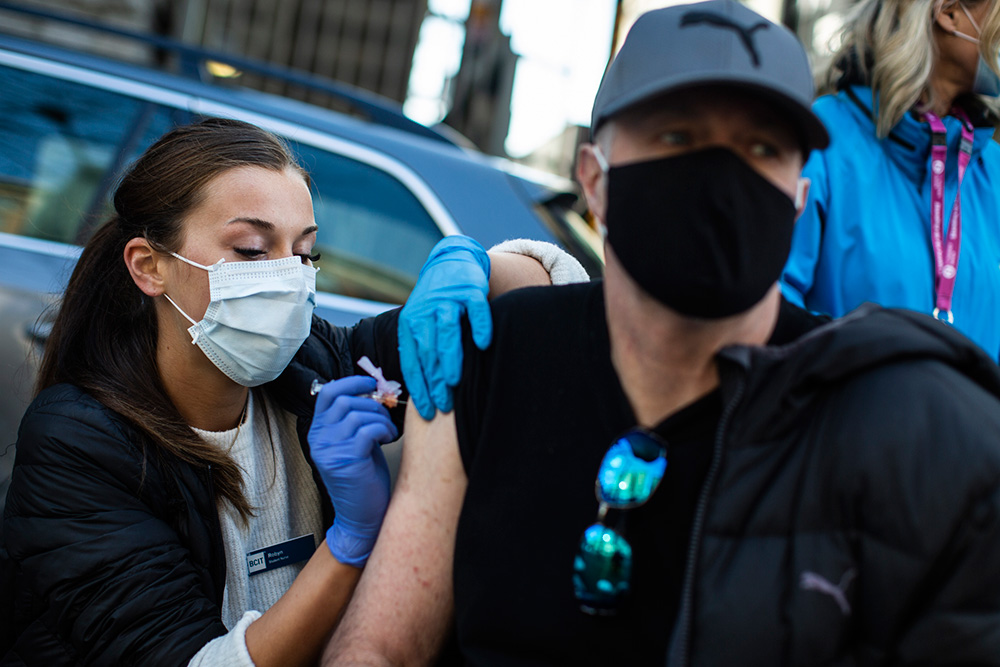Public health officials in British Columbia say all eligible adults over 18 will receive their first COVID vaccine dose by the end of July, two months sooner than initially projected.
The arrival of two new vaccines and a decision to delay the administration of second doses will mean faster first vaccinations for both priority and general populations.
B.C. plans to receive 60,000 doses of the recently approved AstraZeneca vaccine as early as next week and the Johnson & Johnson vaccine, already approved in the U.S., is currently awaiting Health Canada approval. B.C. has been using the Pfizer-BioNTech and Moderna vaccines.
“This is exciting news,” provincial health officer Dr. Bonnie Henry said today. “That means that we will be able to move everyone up in the queue.”
The AstraZeneca vaccine will allow a “parallel track” of vaccinations for first responders and essential workers alongside the age-based rollout for the general population, as soon as the province determines the best way to deploy it.
The AstraZeneca vaccine is the third vaccine to gain approval in Canada. It still requires two doses for maximum effectiveness, but is stable at fridge temperatures, making it easier to use than the Pfizer and Moderna vaccines, which require special freezers.
Henry said the province has considered promising data out of the United Kingdom and extended the time between first and second doses of the Pfizer and Moderna vaccines from six to 16 weeks. That will free up as many as 70,000 more first doses in the next month alone.
Significant immunity appears to last at least four months from the date of the first dose, she said, and B.C.’s own data shows the vaccine has dramatically reduced cases and outbreaks in long-term and acute care settings.
Penny Ballem, head of B.C.’s vaccination program, said extending the delay in second doses means “we will reach much more of our population very quickly.”
The province also announced details of the second phase of B.C.’s age-based rollout of Pfizer and Moderna vaccines, which is set to begin March 15 with seniors 80 and older and Indigenous adults 65 and over living in their own communities.
Each health authority will begin publishing its vaccination booking phone line this week. Fraser Health will also have an online booking platform due to the high number of seniors living in the region.
Seniors over 90 and Indigenous seniors over 75 will be able to call a central phone line in their health authority on Monday to book a vaccine appointment starting the week of March 15.
Those over 85 and Indigenous adults over 70 will be able to call starting March 15 to book appointments beginning March 22, the day those 80 and over or Indigenous and older than 65 will be eligible to phone and book appointments starting March 29.
Seniors’ support people may also book appointments over the phone when the senior is eligible, as long as they have their date of birth, postal code and personal health number.
By April 11, the province expects all 175,000 seniors over 80 will be vaccinated, as well as Indigenous seniors aged 65 and over, due to their higher risk of serious illness and death.
And in mid-April the province’s third vaccination phase will begin, covering the general population descending from aged 79 and adults 16 to 65 who are clinically vulnerable.
The province had planned to complete the process by providing access for 18-to-24-year-olds before the end of September in phase four. Henry says that will now happen by the end of July.
Work is still under way to determine the priority groups like essential workers who will be vaccinated as part of the changes to the plan.
Henry and Ballem noted they will likely include police, paramedics, firefighters, mail carriers and workers in poultry and food processing facilities that have seen high numbers of cases and outbreaks.
“Vaccines are a remarkable tool to help control outbreaks and we have used those around the province to do that successfully,” said Ballem.
The availability of new vaccines and extended second doses will mean that B.C. can likely return to more pre-pandemic activities sooner than expected.
And Henry noted that restrictions in long-term care visits, which have devastated residents’ physical and mental health, are being reviewed in light of the evidence vaccines have brought down the vast majority of cases and outbreaks.
But Henry and Premier John Horgan stressed that the schedule all depends on vaccine supply, which is out of the province’s hands, and easing pandemic restrictions depends on the rate of vaccination.
“We’re hopeful as we go into April that a decrease in transmissibility will enable us to go back to the things we were doing as late as October,” said Henry, noting B.C. doesn’t “yet have enough vaccine or enough people in the community who are protected to let our guard down.”
Guidance to wear a mask, physically distance, and stay home when ill issued nearly one year ago at the outset of the pandemic still applies, and will be critical to ensuring variants of concern don’t take hold as the vaccine rolls out.
“More people will be protected sooner than we had originally planned for, and that is the good news,” said Henry. “But we need to hold on a little longer. We are in the final miles of this marathon, and it is weeks and months.”
“We do not want to see variant infections taking off and undermining our ability to provide protection to people,” she added. ![]()
Read more: Coronavirus
















Tyee Commenting Guidelines
Comments that violate guidelines risk being deleted, and violations may result in a temporary or permanent user ban. Maintain the spirit of good conversation to stay in the discussion.
*Please note The Tyee is not a forum for spreading misinformation about COVID-19, denying its existence or minimizing its risk to public health.
Do:
Do not: